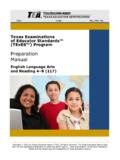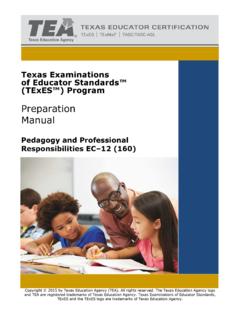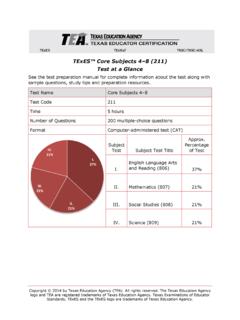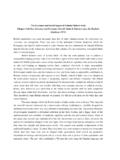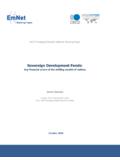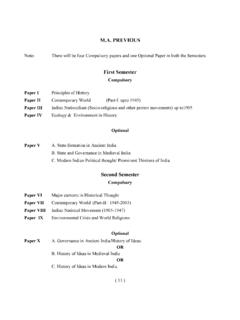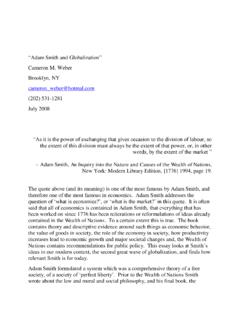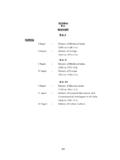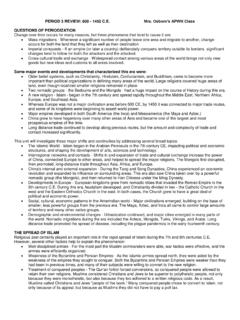Transcription of TExES Social Studies (232) Preparation Manual
1 Copyright 2013 by Texas Education Agency (TEA). All rights reserved. The Texas Education Agency logo and TEA are registered trademarks of Texas Education Agency. Texas Examinations of Educator Standards, TExES and the TExES logo are trademarks of Texas Education Agency. Texas Examinations of Educator Standards ( TExES ) Program Preparation Manual Social Studies 7 12 (232) TExES Social Studies 7 12 (232) 2 NOTE: After clicking on a link, right click and select Previous View to go back to original text. Table of Contents About The Test .. 3 The Domains .. 4 The Standards .. 5 Domains and 7 Domain I World History .. 7 Domain II History .. 9 Domain III Texas History .. 12 Domain IV Geography, Culture and the Behavioral and Social Sciences.
2 14 Domain V Government and Citizenship .. 18 Domain VI Economics and Science, Technology and Society .. 20 Domain VII Social Studies Foundations, Skills, Research and Instruction .. 22 Approaches to Answering Multiple-Choice Questions .. 26 How to Approach Unfamiliar Question Formats .. 26 Question Formats .. 27 Single Questions .. 27 Clustered Questions .. 29 Multiple-Choice Practice Questions .. 33 Answer Key and Rationales .. 53 Study Plan Sheet .. 91 Preparation Resources .. 92 TExES Social Studies 7 12 (232) 3 NOTE: After clicking on a link, right click and select Previous View to go back to original text. About The Test Test Name Social Studies 7 12 Test Code 232 Time 5 hours Number of Questions 140 multiple-choice questions Format Computer-administered test (CAT) The TExES Social Studies 7 12 (232) test is designed to assess whether an examinee has the requisite knowledge and skills that an entry-level educator in this field in Texas public schools must possess.
3 The 140 multiple-choice questions are based on the Social Studies 7 12 test framework. Questions on this test range from grades 7 12. The test may contain questions that do not count toward the score. The number of scored questions will not vary; however, the number of questions that are not scored may vary in the actual test. Your final scaled score will be based only on scored questions. TExES Social Studies 7 12 (232) 4 NOTE: After clicking on a link, right click and select Previous View to go back to original text. The Domains Domain Domain Title Approx. Percentage of Test Standards Assessed I. World History 15% Social Studies 7 12 IV II. History 20% Social Studies 7 12 IV III. Texas History 13% Social Studies 7 12 IV IV.
4 Geography, Culture and the Behavioral and Social Sciences 13% Social Studies 7 12 V, IX V. Government and Citizenship 13% Social Studies 7 12 VII VIII VI. Economics and Science, Technology and Society 13% Social Studies 7 12 VI, X VII. Social Studies Foundations, Skills, Research and Instruction 13% Social Studies 7 12 I III TExES Social Studies 7 12 (232) 5 NOTE: After clicking on a link, right click and select Previous View to go back to original text. The Standards Social Studies 7 12 Standard I The Social Studies teacher has a comprehensive knowledge of the Social sciences and recognizes the value of the Social sciences. Social Studies 7 12 Standard II The Social Studies teacher effectively integrates the various Social science disciplines.
5 Social Studies 7 12 Standard III The Social Studies teacher uses knowledge and skills of Social Studies , as defined by the Texas Essential Knowledge and Skills (TEKS), to plan and implement effective curriculum, instruction, assessment and evaluation. Social Studies 7 12 Standard IV History: The Social Studies teacher applies knowledge of significant historical events and developments, as well as of multiple historical interpretations and ideas, in order to facilitate student understanding of relationships between the past, the present and the future. Social Studies 7 12 Standard V Geography: The Social Studies teacher applies knowledge of people, places and environments to facilitate student understanding of geographic relationships in Texas, the United States and the world.
6 Social Studies 7 12 Standard VI Economics: The Social Studies teacher knows how people organize economic systems to produce, distribute and consume goods and services, and uses this knowledge to enable students to understand economic systems and make informed economic decisions. Social Studies 7 12 Standard VII Government: The Social Studies teacher knows how governments and structures of power function, provide order and allocate resources, and uses this knowledge to facilitate student understanding of how individuals and groups achieve their goals through political systems. Social Studies 7 12 Standard VIII Citizenship: The Social Studies teacher understands citizenship in the United States and other societies, and uses this knowledge to prepare students to participate in our society through an understanding of democratic principles and citizenship practices.
7 TExES Social Studies 7 12 (232) 6 NOTE: After clicking on a link, right click and select Previous View to go back to original text. Social Studies 7 12 Standard IX Culture: The Social Studies teacher understands cultures and how they develop and adapt, and uses this knowledge to enable students to appreciate and respect cultural diversity in Texas, the United States, and the world. Social Studies 7 12 Standard X Science, Technology and Society: The Social Studies teacher understands developments in science and technology, and uses this knowledge to facilitate student understanding of the Social and environmental consequences of scientific discovery and technological innovation. TExES Social Studies 7 12 (232) 7 NOTE: After clicking on a link, right click and select Previous View to go back to original text.
8 Domains and Competencies The content covered by this test is organized into broad areas of content called domains. Each domain covers one or more of the educator standards for this field. Within each domain, the content is further defined by a set of competencies. Each competency is composed of two major parts: The competency statement, which broadly defines what an entry-level educator in this field in Texas public schools should know and be able to do. The descriptive statements, which describe in greater detail the knowledge and skills eligible for testing. Domain I World History Competency 001 (Ancient World Civilizations): The teacher understands significant historical events and developments in ancient world civilizations, factors influencing the development of ancient world civilizations and major characteristics and contributions of ancient world civilizations.
9 The beginning teacher: A. Analyzes the influence of various factors ( , geography, processes of spatial exchange [diffusion], development of agriculture) on the development of early and classical civilizations. B. Demonstrates knowledge of individuals, events and issues that shaped the development of early and classical civilizations. C. Understands major political, economic and cultural developments in and interactions among the civilizations of Africa ( , Egypt, sub-Sahara), the Mediterranean basin ( , Greece, Rome), Mesoamerica ( , Maya), Andean South America ( , Inca tradition), Middle and Near East and Asia ( , China, India, Japan). D. Applies knowledge of the location, political organization, cultural characteristics, and contributions and influence of ancient civilizations.
10 Competency 002 (World History from 600 to 1450 ): The teacher understands significant historical events, developments and traditional points of reference in world history from 600 to 1450 The beginning teacher: A. Demonstrates knowledge of individuals, events, issues and traditional points of reference that shaped the development of world civilizations from 600 to 1450 ( , Mongol conquests, the founding of Islam, Charlemagne, the Norman Conquest, Silk Road). TExES Social Studies 7 12 (232) 8 NOTE: After clicking on a link, right click and select Previous View to go back to original text. B. Demonstrates knowledge of major developments in and interactions among the civilizations of Africa ( , Egypt, sub-Sahara), Mesoamerica ( , Aztec tradition), Andean South America ( , Inca tradition), Europe (including Western and Eastern) and Asia ( , Islamic civilization, China, India, Japan).
